Ukraine’s mufti-turned-fighter Said Ismagilov on the battle for his homeland
Said Ismagilov once helped lead an umbrella group for Ukrainian Sunnis. He discusses frontline life — and his fears over US-led peace talks

A Ukrainian Muslim spiritual leader who swapped his religious robes for fatigues has spoken of his dismay at the direction of US-led peace talks, which could see his hometown permanently surrendered to Russia.
Since taking office, Donald Trump has blamed Ukrainian president Volodymyr Zelenskyy for the invasion and said Russia should not have to give back any captured territory — which would include the disputed Donbas region in eastern Ukraine, where Said Ismagilov grew up.
“We didn’t expect such open pressure from the US on Ukraine, as if we were the aggressor and not Russia,” Ismagilov, a junior lieutenant, told Hyphen during a brief visit to Kyiv from the front line, where he has served since 2023.
He hopes that European countries will step up support.
“I always pray for our victory,” he added. “The defeat of Ukraine means the defeat of our freedom.”
Ismagilov, 46, is the former mufti of Umma — a Muslim umbrella organisation and advocacy group that represents many of Ukraine’s 600,000 Sunnis. He has lost two homes to the Russian invasion.
There is evidence that Russia is committing rights violations and war crimes in the areas it occupies — arrests, torture and disappearances, deportations, and deliberate erasure of identity and values. Such measures have also been used against Ukraine’s largest Muslim minority, the Crimean Tatars, since its annexation in 2014.
“Even prayers were seen as a threat”
Ismagilov’s Volga Tatar ancestors left central Russia a century ago during Soviet collectivisation. He studied in Donetsk — the largest city in the Donbas region — and Moscow before becoming an imam. Umma was founded in 2008. “We built a religious life in Donbas,” he said. “It was my homeland.”
By 2014, after decades of immigration driven by the region’s demand for industrial labour, Donbas had Ukraine’s largest Muslim population outside Crimea — including ethnic Tatars like Ismagilov from Russia, Meskhetian Turks originally deported from Georgia, and Crimean Tatars forcibly relocated during the second world war.

But after mass popular demonstrations that year toppled Ukrainian president Viktor Yanukovych, Russia annexed Crimea and fomented a separatist conflict in Donbas. Russian-backed forces took over government offices and declared two separatist republics. People who protested or were suspected of supporting Ukraine were disappeared into prisons and makeshift detention centres. Some 30,000 Muslims have since fled for free Ukrainian territory, Ismagilov estimates; others left for Russia and Turkey.
Ismagilov joined a five-month “prayer marathon” that held peaceful, multi-faith prayer sessions daily in central Donetsk. “We just took it in turns to pray for Ukraine; Christians with Christian prayers, Muslims with Muslim prayers,” he said. “But even this was seen as a threat.”
The marathon was broken up in September 2014. Sixteen participants were detained and some tortured. Armed men came to Ismagilov’s mosque but, having been warned by a pastor that he would be targeted, he had already left Donetsk with his family.
Like many displaced people from Crimea and occupied east Ukraine, Ismagilov bought a flat in the small Kyiv satellite town of Bucha. Then in 2022, the war caught him up again when Russia invaded.
Bucha was occupied by Russian forces in February that year. Ismagilov had been preparing for full-scale war, training with local self-defence groups. He managed to evacuate his family and reach Kyiv, but the military recruitment office turned him away because of his lack of experience.
Instead he became a voluntary paramedic, evacuating the injured, including from Bucha after it was liberated at the end of March 2022 (his flat had been looted, and many local people killed) and then from some of the worst battle sites in east Ukraine. “We had weapons, but our main weapons were our hands, with which we tried to save the wounded,” he said.
In October 2023 he was drafted, serving in the Kyiv region’s anti-aircraft forces, and then with the 57th Brigade’s unmanned aviation unit, currently on the Kharkiv front.

Ismagilov stepped down as the mufti of Umma in November 2022. He continued to lead prayers when possible in mosques near the front line, even reading amid the ruins of Bakhmut before it was occupied by Russia, but army duties come first — Ramadan, for example, was impossible to observe when on active duty.
“Islam orders a man to protect his family, his homeland, his people, his land,” he said. “Even the Prophet Muhammad, peace be upon him, went into battle with a weapon in his hand and was wounded. For a Muslim spiritual leader, this is normal.”
During three years of action, Ismagilov has seen warfare change completely. First person view (FPV) and strike drones now dominate. “Contact fighting is rare,” he said. “There’s no point in it, since as soon as a soldier comes out from shelter a FPV drone will hit him. War has become something completely different.”
Ismagilov is also fighting in an information war. Last year, during Ramadan, he was offered the opportunity to visit one of Ukraine’s prisoner of war camps and talk to Tatars who had been captured while fighting for Russia. Some of the interviews, given with the prisoners’ consent, are available on YouTube.
“I wanted to show Tatars who live in Russia and Ukraine, and anyone who is interested, what drives these people,” Ismagilov said.
The 20 combatants he spoke to said they had signed military contracts because they could not find enough work at home to pay off mortgages or other debts. About a third knew the Tatar language; several identified themselves not as Tatar at all, but as Russian only. “In Russia, to be a member of an ethnic minority is shameful, and to be a member of the titular nation is fashionable,” said Ismagilov.
This attitude in Russia to ethnic minorities — who, in numbers per 100,000 male population, lead Russian military casualties — partly drives his passionate defence of Ukraine. While Russia’s 20 million Muslims are stigmatised and treated as a threat, Ismagilov says Muslims in Ukraine — who make up about 1.4% of the population — enjoy full religious freedom and are well integrated into society, serving in parliament as well as the army (although only this year will the defence ministry — now headed by Rustem Umerov, a Crimean Tatar — finally start issuing halal ration packs).
“We take an active civil position,” Ismagilov said. “We fight together, build together, and defend together, and this is because there is a normal attitude towards Muslims. They are not seen as aliens or enemies or immigrants, but as part of the Ukrainian nation.”
 Newsletter
Newsletter












